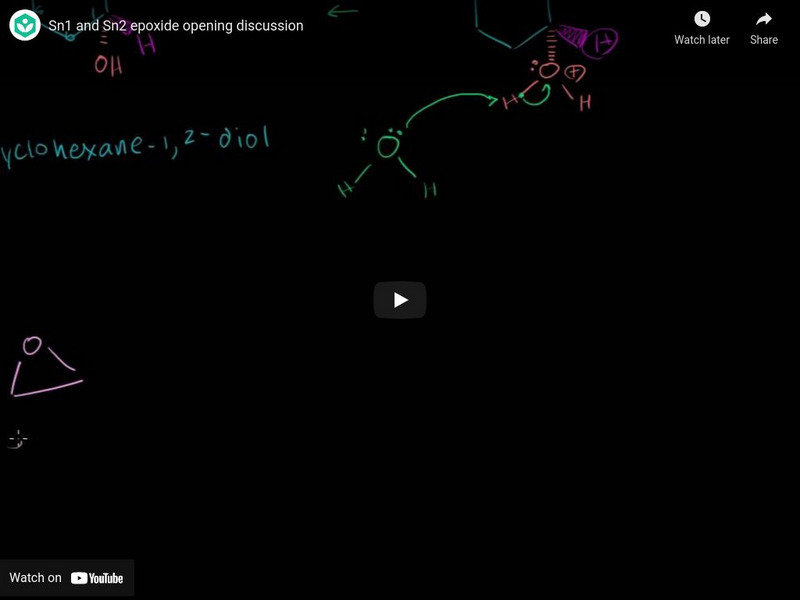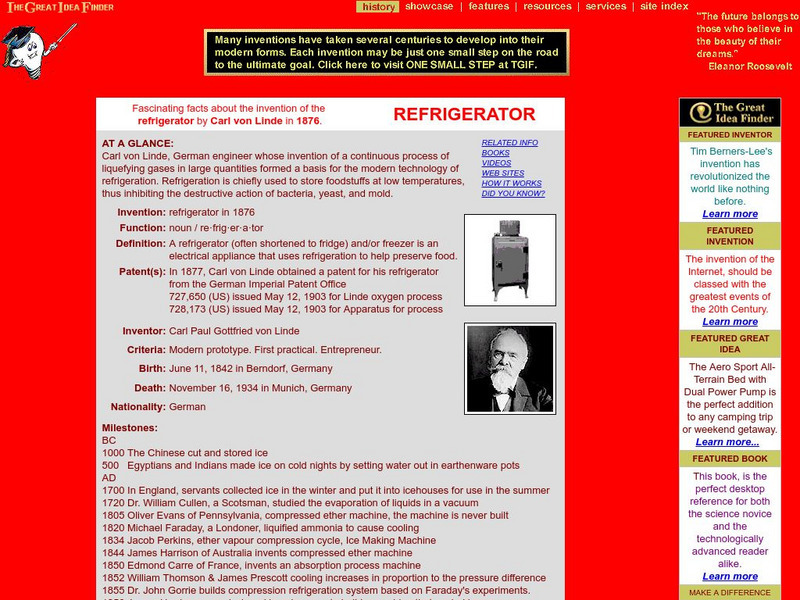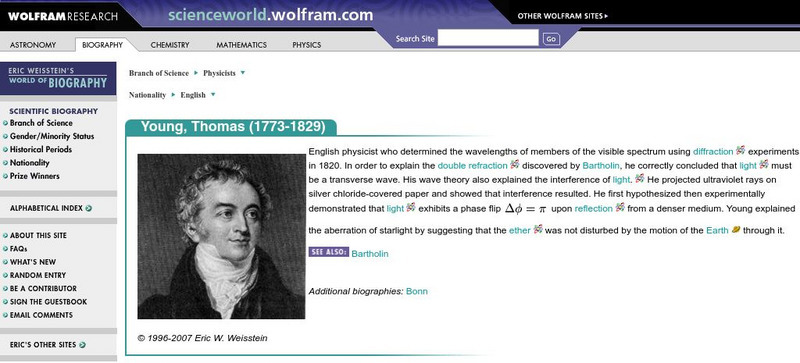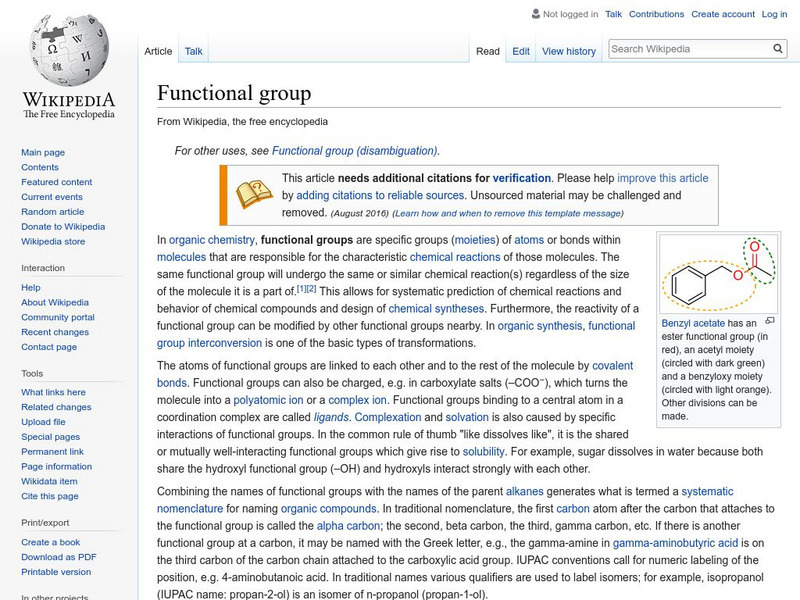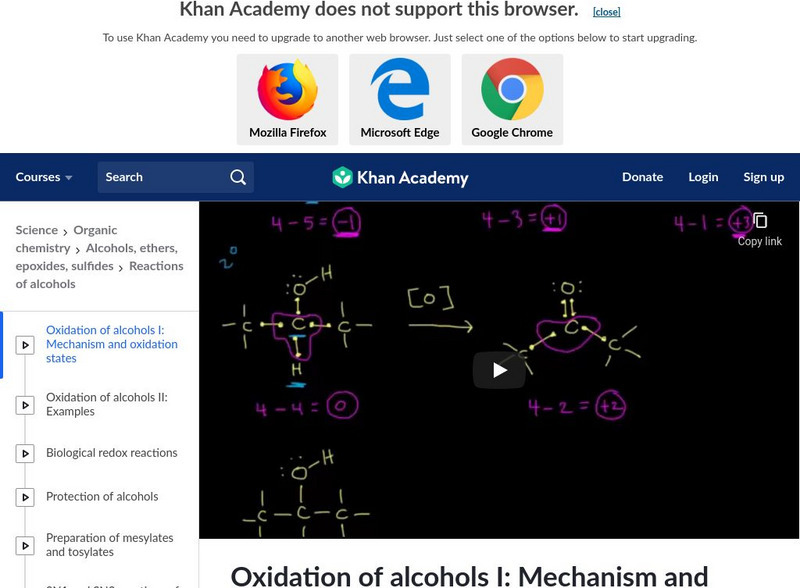Ethers Teacher Resources
Find Ethers lesson plans and worksheets
Showing 125 resources
Khan Academy
Khan Academy: Sn1 and Sn2 Epoxide Opening Discussion
Video lecture presents Sn1 and Sn2 epoxide opening discussion. [7:59]
Khan Academy
Khan Academy: Sn1 and Sn2 Reactions of Alcohols
This video lesson discusses SN1 and SN2 reactions of alcohols. This video lesson was developed in collaboration with the Association of American Medical Colleges and Khan Academy.
Great Idea Finder
The Great Idea Finder: Refrigerator
This site provides a brief overview of the invention of the refrigerator.
Wolfram Research
Wolfram Science World: Maxwell, James
This ScienceWorld site describes the Scottish mathematician and physicist James Maxwell (1831-1879) who published physical and mathematical theories of the electromagnetic field.
Other
Is the Speed of Light Constant?
Using a question and answer format, this page discusses the question: "Is the Speed of Light Constant?" Discusses some of the history and experiments performed with light and the conclusions drawn from those findings.
University of St. Andrews (UK)
University of St. Andrews: Special Relativity
A historical approach to special relativity, giving all the events and names in the history of discovery of special relativity. Many links to these individuals.
Wolfram Research
Wolfram Science World: Michelson, Albert
This ScienceWorld site provides a short biographical sketch of Albert Michelson and describes his most notable scientific discoveries and contributions. Several links are provided for additional information as well.
Wolfram Research
Wolfram Science World: Fresnel, Augustin
This site from ScienceWorld provides a short biographical sketch of Augustin Fresnel (1788-1827 CE) and describes his most notable scientific discoveries and contributions. Links are provided throughout for additional information.
Wolfram Research
Wolfram Science World: Organic Chemistry
This site from ScienceWorld provides a brief look at some of the more common organic functional groups. The carboxylic acid group is also given. Quite a few links are provided at the bottom of the page for additional information.
PBS
American Experience: Technology Timeline: 1752 1990
Short descriptions of important technological innovations produced in America and the date of their introduction.
Curated OER
Educational Technology Clearinghouse: Clip Art Etc: John W. Keely
Keely was an inventor of a motion motor and used etheric technology.
Curated OER
Educational Technology Clearinghouse: Clip Art Etc: William Morton
(1819-1868) American dentist who demonstrated the use of ether as an anesthesia.
Curated OER
Educational Technology Clearinghouse: Clip Art Etc: William Morton
The use of ether to induce a sleep like state was discovered by William Morton in 1846.
Wolfram Research
Wolfram Science World: Young, Thomas
This site from ScienceWorld provides a very short but factual biographical sketch of Thomas Young (1773-1829 CE) and describes his most notable scientific discoveries and contributions. Links are also provided throughout for additional...
Wikimedia
Wikipedia: Functional Group
Encyclopedia entry for functional groups that, in in organic chemistry, are specific groups of atoms within molecules that are responsible for the characteristic chemical reactions of those molecules.
Khan Academy
Khan Academy: Preparation of Alcohols Using Na Bh4
Understand the general reaction of a carbonyl compound, sodium borohydride, to prepare alcohols with this video. Video gives you several examples to show how alcohols are produced and whether the reaction is oxidized or reduced. [12:35]
Khan Academy
Khan Academy: Oxidation of Alcohols I: Mechanism and Oxidation States
A video investigation of what it takes to oxidize alcohols. Video gives examples of how to calculate oxidation states by using electronegativity differences. Also learn what is formed as alcohols are oxidized. [12:37]
Khan Academy
Khan Academy: Ring Opening Reactions of Epoxides: Strong Nucleophiles
Understand the ring opening reactions of epoxides using a strong nucleophile in this video. Video will give several examples of this reaction to allow you to understand the steps. [14:06]
Khan Academy
Khan Academy: Preparation of Sulfides
A video showing how to prepare sulfides from thiols. [6:58]
Khan Academy
Khan Academy: Triple Bonds Cause Linear Configurations
Understand the linear geometry of a triple bond. [1:11]
Khan Academy
Khan Academy: Physical Properties of Alcohols and Preparation of Alkoxides
The physical properties of alcohols. How an alcohol can be deprotonated to form an alkoxide. [11:15]
Khan Academy
Khan Academy: Synthesis of Alcohols Using Grignard Reagents I
Understand the synthesis of primary, secondary, and tertiary alcohols from aldehydes and ketones using Grignard reagents. [13:44]
Khan Academy
Khan Academy: Preparation of Alcohols Using Li Al H4
Learn how to prepare a primary or secondary alcohol from an aldehyde, ketone, carboxylic acid, or ester using lithium aluminum hydride. [11:17]
Khan Academy
Khan Academy: Preparation of Epoxides: Stereochemistry
Stereochemistry of epoxide preparation and how it relates to mechanism. [14:55]
Other popular searches
- Ethers and Esters
- Alcohols Ethers
- Alcohol and Ether
- Ether Fruit Fly
- Ether and Fruit Fly
- Ether Pad
- Ether and Fruitfly
- Ether's and Esters
- Ether Fruitfly
- Emmy No Ether
- Amalie Emmy No Ether


